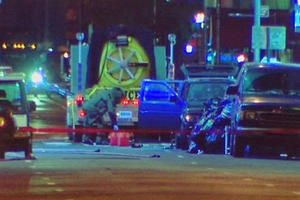White House: U.S. "in much better position" on terrorism
The White House sought to reassure the traveling public that it has fixed security lapses that led to the foiled bomb attack aboard a U.S.-bound jetliner last Christmas; John Brennan, the president’s chief counterterrorism and homeland security adviser, said the country’s security infrastructure has improved since Nigerian-born Umar Farouk Abdulmutallab smuggled explosives hidden in his underwear onto an airplane headed for Detroit; Brennan: “What we have seen recently is increased focus, I think, on the part of terrorist groups to try to carry out some of these smaller-scale attacks…. And so we are staying very focused on our ability to detect those types of attacks and stop them whether or not they’re by individuals or part of a larger, organizational effort”

NYPD bomb squad operators neutralize explosives // Source: csmonitor.com
The White House sought to reassure the traveling public that it has fixed security lapses that led to the foiled bomb attack aboard a U.S.-bound jetliner last Christmas. Security officials have been on edge for days because of an increase in intelligence “chatter” about a possible holiday-season attack, though officials said there have been no specific, credible threats.
John Brennan, the president’s chief counterterrorism and homeland security adviser, said the country’s security infrastructure has improved since Nigerian-born Umar Farouk Abdulmutallab allegedly smuggled explosives hidden in his underwear onto an airplane headed for Detroit.
“I’m confident that … we are in a much better position today than we were last year at this time,” Brennan said at a news conference in the White House briefing room.
NPR quotes Brennan to say that one change is that security agencies are now focused on the potential for multiple small attacks in addition to the potential for a single catastrophic attack. “What we have seen recently is increased focus, I think, on the part of terrorist groups to try to carry out some of these smaller-scale attacks,” Brennan said. “And so we are staying very focused on our ability to detect those types of attacks and stop them whether or not they’re by individuals or part of a larger, organizational effort.”
Brennan also said that each time an attack is thwarted, President Obama insists on identifying where the system worked and where it fell short, then making appropriate changes to fix the problems.
After the failed jetliner attack last Christmas, the Obama administration has dealt with an attempted car bombing in Times Square, a nearly successful attack on U.S.-bound cargo planes, and several alleged plots disrupted by the FBI.
Obama’s security team also was forced to defend itself amid questions about why Director of National Intelligence James Clapper was not in the loop about a roundup of a dozen terrorism suspects this week in London.
On Tuesday night, Clapper appeared with Brennan on ABC News and seemed stumped when asked whether the suspected plot in London could have threatened the United States. “London?” Clapper asked, looking at Brennan.
It was an embarrassing moment for the embattled position of director of national intelligence, a job created after the terrorist attacks of 9/11, that critics say has failed to live up to its billing as a central, strong figure who would lead the nation’s intelligence infrastructure.
At the Wednesday’s news conference, Brennan said the United.States was “in constant contact” with the British “to work with them closely, to find out whether or not there’s any nexus here to the homeland, find out what we can about their motivations, intentions and where their operational planning was going.”
He vigorously defended Clapper, noting that Clapper was focused on escalating tensions on the Korean peninsula and a nuclear weapons treaty with Russia. Brennan acknowledged, though, that Clapper should have been briefed.
“Should he have been briefed by his staff on those arrests? Yes,” Brennan said, adding that it he was “glad” that Clapper “is not sitting in front of the TV 24 hours a day and monitoring what’s coming out of the media.”
